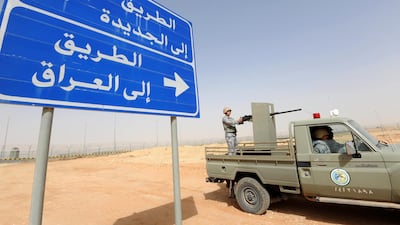Iraq is a step closer to importing GCC electricity through Saudi Arabia, Foreign Minister Fouad Hussein said on Thursday, as the government tries to tackle decades-long shortages and reduce its dependence on Iran for power.
Iraq will buy 400 megawatts from a GCC electricity network passing through Saudi Arabia, the official Iraqi news agency reported.
Mr Hussein said the purchase has been “pinned down” and that this had been agreed with Saudi Arabia during the previous Iraqi government of Adel Abdel Mahdi, which ran Iraq from 2018 until May this year.
“Iraq still needs electricity and bilateral co-operation is important in this field,” Mr Hussein said.
He was speaking after a teleconference on Tuesday with Saudi Foreign Minister Faisal bin Farhan, during which the two ministers discussed reopening the land border between the two countries and a Saudi commercial mission in Baghdad.
Relations between Iraq and Arab Sunni states improved after Iraqi intelligence chief Mustafa Al Kadhimi came to office in May with the support of the US, and signalled that he would try to curb the influence of pro-Iranian militias.
The Wall Street Journal reported in August that the US administration of President Donald Trump has been urging the new government to proceed with connecting Iraq's power grid with Saudi Arabia and Kuwait to reduce Baghdad's dependence on Iranian energy.
In September, the US renewed a sanctions waiver that allows Iraq to buy gas from Iran. But the State Department said it believed Iraq could take “meaningful actions” to reduce its reliance on Iranian energy.
Last year Iraq signed a deal with the GCC to build a 300-kilometre transmission line from Kuwait to import 500 megawatts by 2020.
Iraq’s power grid is a shambles, with electricity theft common, and the electricity sector as a whole infested with corruption. Deals with foreign suppliers rarely materialise.
The Iraqi network has the capacity to produce only an estimated 16,000MW – far short of its estimated need of 24,000 to 30,000MW.
Billions of dollars went to supposedly fixing the electricity sector, with large white elephant power plants and imaginary grid expansions.
Iraq's electricity production comfortably exceeded demand before UN sanctions were imposed on Baghdad for its invasion of Kuwait in 1990.
Mudher Salih, a veteran Iraqi economist who advises the government, said in May that the electricity sector cost the treasury about $10 billion a year to run but generated only 7 per cent of its operating costs in revenue.

